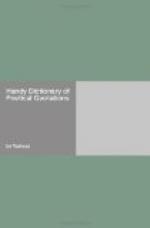In travelling
I shape myself betimes to idleness
And take fools’ pleasures....
1944
GEORGE ELIOT: Spanish Gypsy, Bk. i.
=Treason.=
Then I, and you, and all of us fell down,
Whilst bloody treason flourish’d over us.
1945
SHAKS.: Jul. Caesar, Act iii., Sc.
2.
So Judas kiss’d his master,
And cried—All hail! when as he meant—all
harm.
1946
SHAKS.: 3 Henry VI., Act v., Sc. 7.
Treason doth never prosper: what’s the reason? Why, if it prosper, none dare call it treason. 1947 SIR JOHN HARRINGTON: Epigrams, Bk. iv., Epigram 5.
Treason is not own’d when ’tis descried;
Successful crimes alone are justified.
1948
DRYDEN: Medals, Line 207.
=Treasure.=
The unsunn’d heaps
Of miser’s treasure.
1949
MILTON: Comus, Line 398.
=Trees.=
Trees can smile in light at the sinking sun Just as the storm comes, as a girl would look On a departing lover—most serene. 1950 ROBERT BROWNING: Pauline, Line 726.
The groves were God’s first temples. Ere
man learned
To hew the shaft, and lay the architrave,
And spread the roof above them.
1951
WILLIAM CULLEN BRYANT: Forest Hymn.
Sure thou didst flourish once! and many springs, Many bright mornings, much dew, many showers, Passed o’er thy head; many light hearts and wings, Which now are dead, lodg’d in thy living bowers. 1952 HENRY VAUGHAN: The Timber.
A brotherhood of venerable trees. 1953 WORDSWORTH: Sonnet composed at —— Castle.
=Trial.=
We learn through trial.
1954
MARGARET J. PRESTON: Attainment, St. 7.
=Trifles.=
Since trifles make the sum of human things, And half our misery from our foibles springs. 1955 HANNAH MORE: Sensibility.
Think nought a trifle, though it small appear;
Small sands the mountain, moments make the year;
And trifles life.
1956
YOUNG: Love of Fame, Satire vi., Line
193.
=Triumph.=
Why comes temptation, but for man to meet
And master, and make crouch beneath his foot,
And so be pedestaled in triumph?
1957
ROBERT BROWNING: The Ring and the Book,
Line 1185.
=Trouble.=
Double, double toil and trouble,
Fire burn, and cauldron bubble.
1958
SHAKS.: Macbeth, Act iv., Sc. 1.
To be, or not to be: that is the question:
Whether ’tis nobler in the mind to suffer
The stings and arrows of outrageous fortune,
Or to take arms against a sea of troubles,
And by opposing end them.
1959
SHAKS.: Hamlet, Act iii., Sc. 1.
=Truth.=
Truth is the highest thing that man may keep. 1960 CHAUCER: The Frankeleines Tale, Line 11789.
O, while you live, tell truth, and shame the devil. 1961 SHAKS.: 1 Henry IV., Act iii., Sc. 1.




